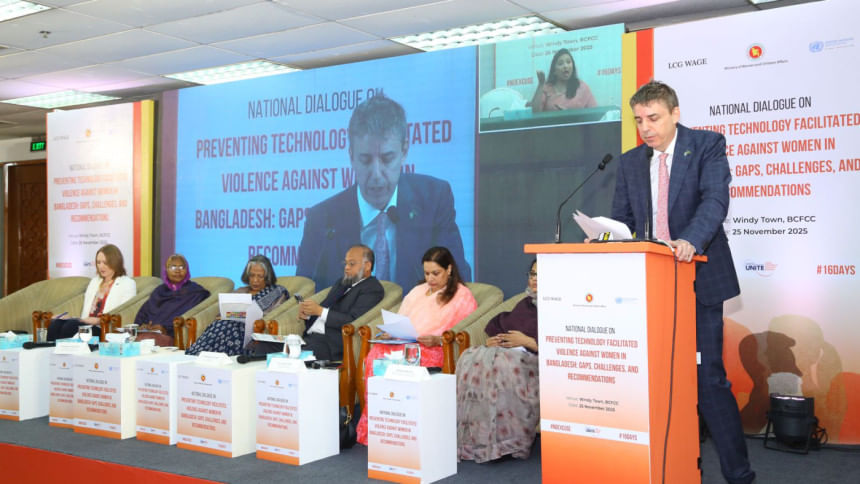The Ministry of Women and Children Affairs, the Local Consultative Group on Women's Advancement and Gender Equality, and the United Nations held the 2025 national opening of the global 16 Days of Activism against Gender-Based Violence at the Bangladesh China Friendship Conference Center. The focus this year is "UNiTE to End Digital Violence Against All Women and Girls."
Senior officials, UN agencies, foreign missions, civil society, youth groups, and technology experts joined the programme. The discussion centred on rising technology-linked abuse and protection for women and girls online.
Chief guest Sharmeen S. Murshid said, "Before, a girl couldn't go out on the street without thinking of eve teasing; now you cannot enter your cyber space without being stalked. And the stalking world has become huge. It's not just a boy from a neighbourhood - it's anybody anywhere in the world who can hunt your dignity. Technology has to move its way, but it's our own attitude that will determine its course. So the 16 Days of Activism is just a reminder and perhaps a concerted effort that we need to make every single day of our lives."
Mamtaz Ahmed, NDC, Senior Secretary of MoWCA, focused on stronger laws, coordination, and public awareness. International partners highlighted the global scale of digital abuse.
World Bank data shows that fewer than 40 per cent of countries have laws against cyber harassment or cyberstalking. As a result, 1.8 billion women and girls remain without legal protection.
Susan Ryle, High Commissioner of Australia, called for united action across sectors to ensure technology becomes a tool for empowerment rather than harm, ""It's not just a women's issue, it's an issue for all of us. So let us stand together—governments, organizations, champions and women - to build a world where technology inspires, sport inspires, and partnerships deliver safety and equality for every woman and girl."
Nicolas Weeks, Ambassador of Sweden, stressed the importance of enforcement, "Proper implementation of existing laws is needed to enable access to justice for victims of gender-based violence. It also signals to perpetrators that these crimes will not go unpunished. The enactment of a Sexual Harassment Prevention and Protection Ordinance is crucial for ensuring the rights and freedoms of women, girls and boys."
Gitanjali Singh, UN Women Representative, highlighted the global scale of the problem, "Digital violence knows no borders. Worldwide, between 16 and 58 percent of women and girls face online violence or harassment. Online harassment and bullying frequently spill into offline spaces, silencing women's voices and restricting their participation in public life. A different future is possible. If our ambition is for a peaceful, prosperous, and resilient Bangladesh, then there can be no higher priority for our support than women and girls. Together, we can create a future where women and girls are safe everywhere in Bangladesh. We owe it to women and girls."
A high-level panel then examined the gaps and challenges. Speakers from BTRC, UGC, the Law and Justice Division, and Youth Policy Forum discussed weak enforcement, low digital literacy, and limited reporting pathways. They also pointed to the need for a coordinated national framework and better support systems.
In her closing remarks, UNFPA Representative Catherine Breen Kamkong said, "Technology Facilitated GBV is real and it deserves the same serious attention as any other form of GBV. Recognizing it clearly as we have done here today is a very small step forward. We need a legal framework and guidelines to improve investigation. The prevention and response need to be survivor centric."
Speakers throughout the programme underscored that digital abuse is a human rights risk that affects safety, freedom, and democratic participation. They called for stronger laws, accountability from technology firms, survivor-focused systems, and expanded digital literacy.
The 2025 campaign urges government, private sector, civil society, youth networks, and international partners to work jointly to stop technology-linked violence as Bangladesh marks 30 years of the Beijing Declaration.

